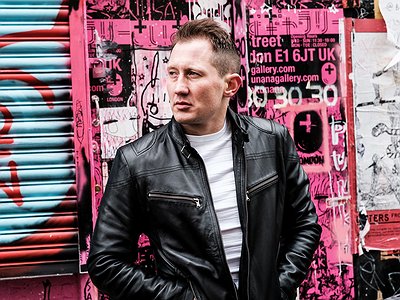Name: Oliver Darling
Nationality: British
Occupation: Guitarist, singer, songwriter
Recent release: Oliver Darling's Lee's Blues is out via Another Planet.
If you enjoyed this interview with Oliver Darling about the guitar and would like to explore his work and various projects in more depth, visit his official website. He is also on Instagram, Facebook, twitter, and Soundcloud.
In the light of picking your instrument, how would you describe your views on topics like originality and innovation vs perfection and timelessness in music? Are you interested in a “music of the future” or “continuing a tradition”?
I would love to make music of the future, but I think that if you set out trying to make a 'new' sound that you never will. I think innovation often accidently comes from experimentation and following where a creative seed takes you. I wonder if Jimi Hendrix or Kraftwerk set out to create something new or whether they just did something that intrigued them and didn't care if anyone else liked it? I'm sure there's an answer on Google!
I've always been a very traditional player, trying to faithfully replicate my heros to the best of my ability, so probably wouldn't try to do something new with the guitar. I do love new music though. I started listening to and playing country blues and folk, but I'm also a massive Daft Punk (not that they're new anymore!) fan and would love to make some more modern stuff like that.
Another way I look at it is like how I imagine an abstract artist works … anyone can splash a load of colours on a canvas and call it art. But I bet the true greats can also paint perfectly in a more traditional sense - they will probably have learnt and honed their craft first.
As a comparison to blues, which some might think of as a simple music, the best guys make it look easy, but they deceptively display taste - there's a saying- 'it's not what you play that counts, it's what you don't play'.
Peter Green was a master of that, as I'm sure he learnt from one of his heros, BB King. BB's style changed over the years, but probably he's best known for the mid/later style of minimal riffs, usually around the same five notes! Every so often at an ending he'll throw in a really tasty jazz riff full of notes, and you think 'where did that come from?!' … of course he could do it!
What, to you, are some of the most interesting guitar recordings and - performances by other artists in terms of your personal development?
I keep saying the same names!
For me, Big Bill Broonzy-particularly “Glory of Love”. It's a bluesy version of a standard, the timing, the swing, the dexterity, the sound. Peter Green (the Blue Horizon stuff and Then Play On) and Johnny Moore (all his stuff with Charles Brown, particularly “Driftin Blues”). I'd say these are my three biggest influences.
The stuff Eric did I've already touched upon, but later Unplugged is a fantastic album for the performance and songwriting.
I find Eric's stuff interesting because he's spanned a number of decades and gone through a lot of different styles. Also, T Bone Walker, Freddie and BB King, Stevie Ray Vaughan, Rory Gallagher, Magic Sam, Chuck Berry … so many!
Could you describe working with the guitar on the basis of one of your pieces, live performances or albums that's particularly dear to you, please?
I love it when I get a Big Bill Broonzy type track swinging and my guitar sounds great, or come up with something tasty on a Charles Brown type track. We've been performing the originals off my latest album live, and they've been coming together great, so playing one of your own tracks and having it come alive is really exciting.
Recording wise, as I've already mentioned, I love building up tracks with different guitars. This latest album, Lee's Blues, doesn't feature too many guitar layers, “You Should Be Worried” being the most produced, but putting the dobro on that and double tracking the guitar in the middle eight really added something. Then it had to have piano on and violin!
How, would you say, does the guitar interact with other instruments from ensembles/groups you're part of?
It depends what I'm doing, but on most projects one thing I'm usually doing is putting in a solid rhythm part - the guitar's a good midfielder, and although it doesn't offer loads of bass, it covers the midrange textures, gives tonal and melodic shape, and also has a percussive element allowing you to emphasise different parts of the note and beat.
With songwriting, it's a common thing to write on an instrument which isn't your first / prefered (ie a guitarist writing with a piano) because your hands tend go on autopilot - if you're not as familiar with the instrument you get lost more, and therefore stumble upon different ideas.




